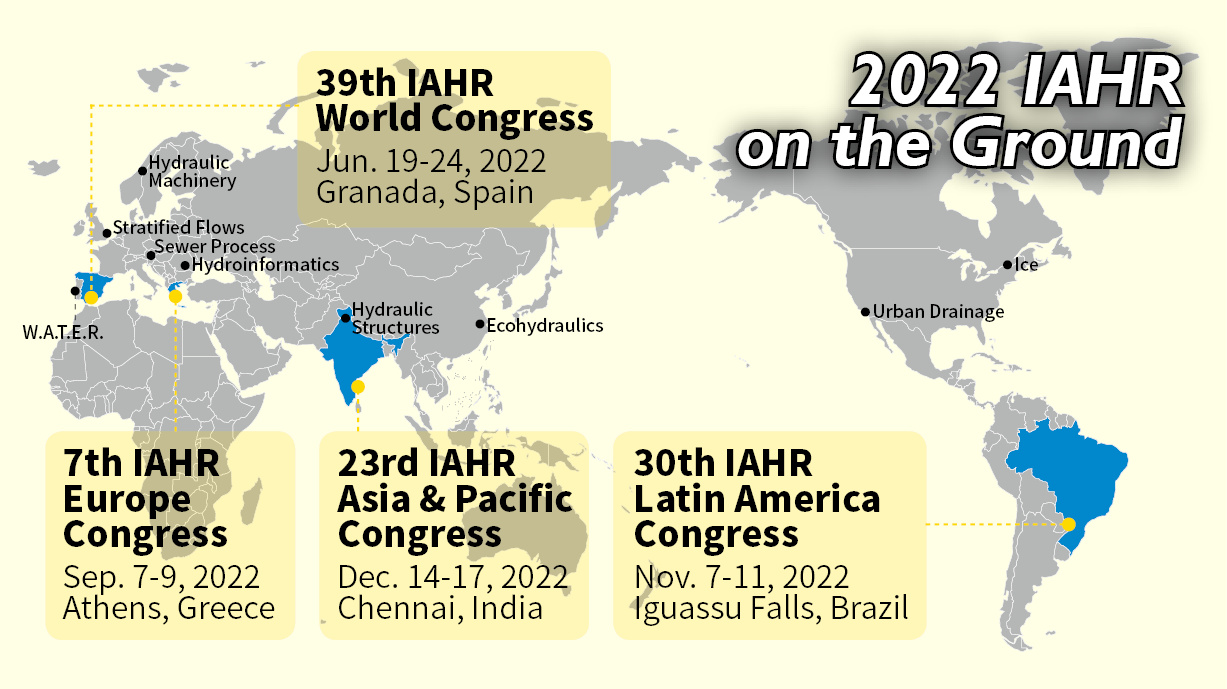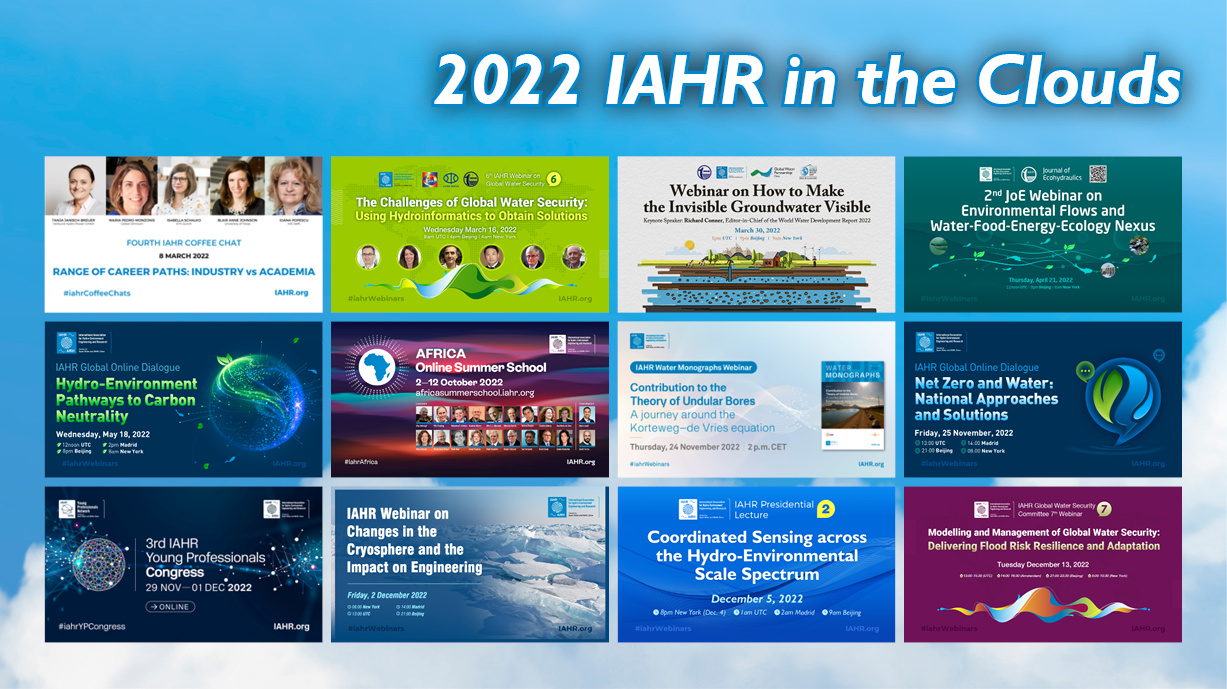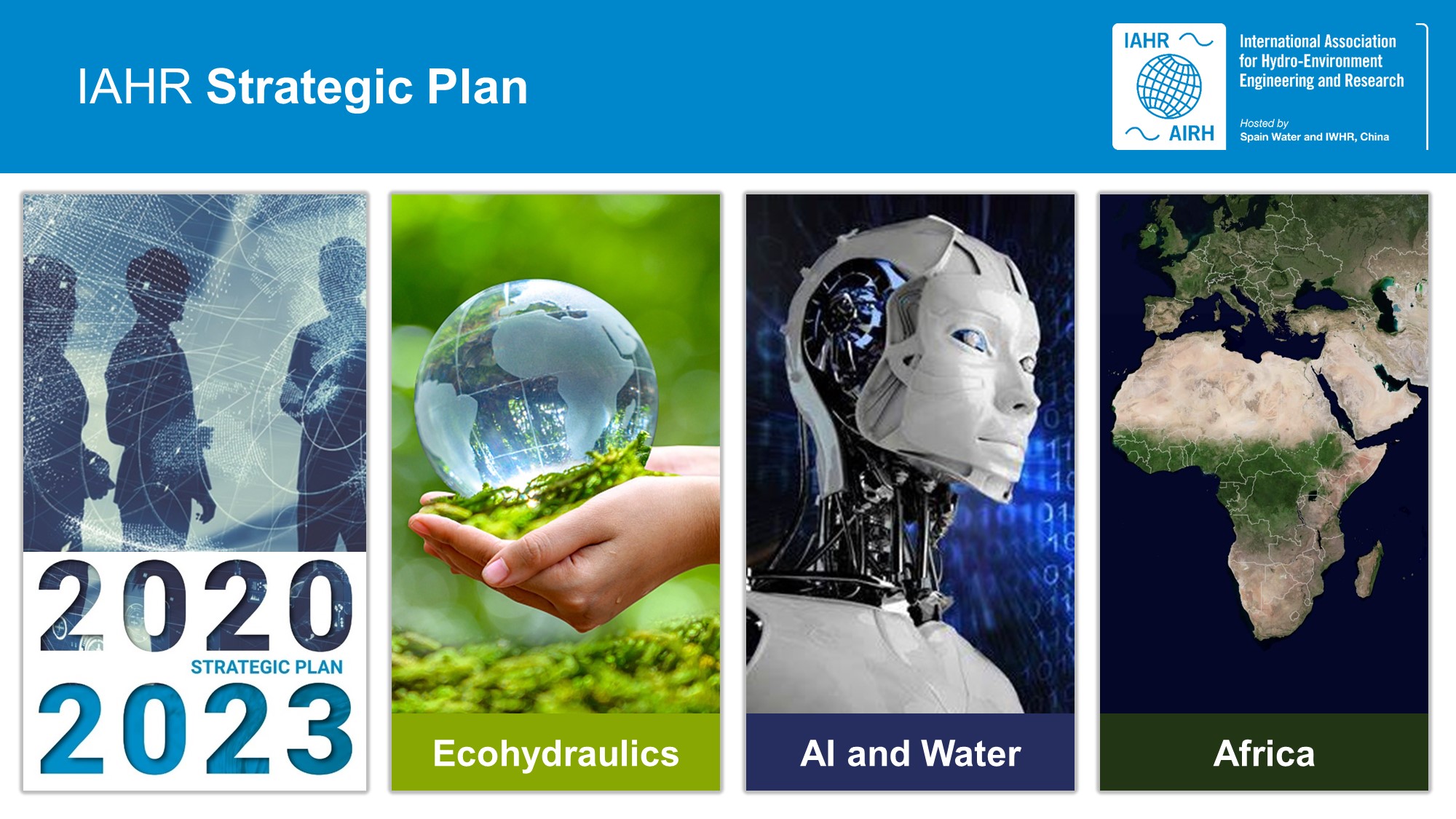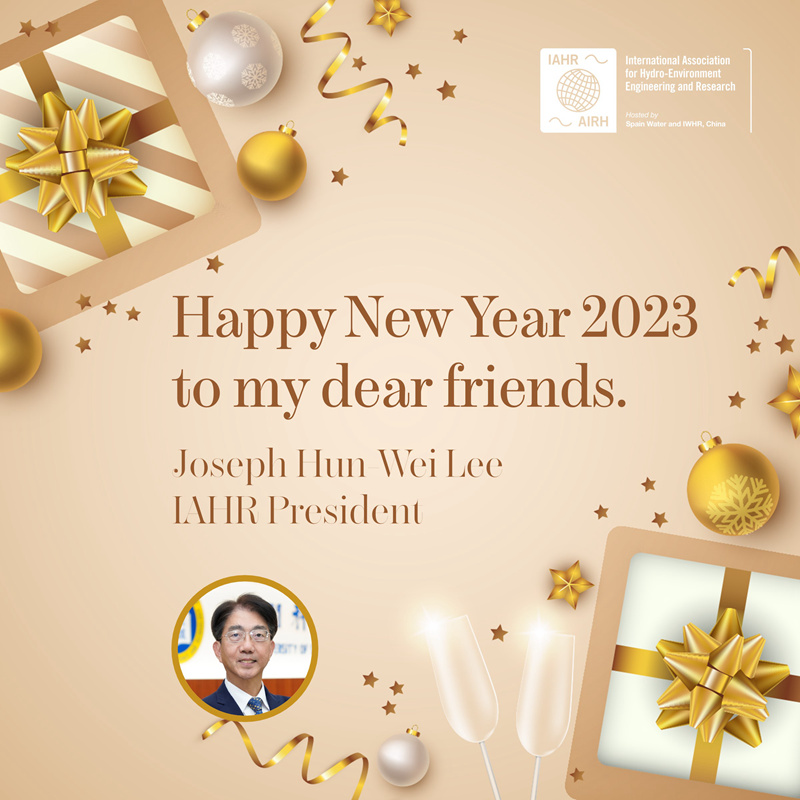2023 New Year Message from IAHR President
Dear Friends and Colleagues,
As we bid farewell to 2022, I would like to send my very best wishes for a Happy and Prosperous New Year!
The past year has been a turbulent year - heat waves, floods and droughts, geo-political conflicts and supply chain disruptions, world population exceeding 8 billion, Omicron, and many countries trying to adjust to the return to normality with the dissolution of pandemic controls. 2022 was also an eventful year for IAHR.
After a one-year delay, the 39th IAHR World Congress held in Granada, Spain, from 19 to 24 June 2022, was a resounding success. About 1,200 people from more than 70 countries attended the signature IAHR event that featured 3 keynote speakers, 4 high-level panels, over 100 technical sessions and 8 technical visits, as well as a series of tailored events for the young professionals. People were talking face-to-face with a smile on their face and ripples of laughter ran around the rooms. All of us who were there thoroughly enjoyed the intellectual exchanges, the JFK Best Student Paper, and the friendship of colleagues with a family spirit so characteristic of IAHR.
Granada was not alone. Regional congresses were convened in Athens, Greece, in September (the 7th IAHR Europe Congress), in Iguassu Falls, Brazil, in November (the 30th IAHR Latin America Congress), and in Chennai, India, in December (the 23rd IAHR Asia and Pacific Congress). IAHR experts gathered in Costa Mesa, USA, for the 12th Urban Drainage Modeling Conference, in Montreal, Canada, for the 26th IAHR International Symposium on Ice, in Trondheim, Norway, for the 31st IAHR Symposium on Hydraulic Machinery and Systems, in Bucharest, Romania, for the 14th International Conference on Hydroinformatics, in Lisbon, Portugal, for the 6th Workshop on Advanced measurement Techniques and Experimental Research, in Graz, Austria, for the 10th International Conference on Sewer Processes and Networks, in Cambridge, UK, for the 9th International Symposium on Stratified Flows, in Nanjing, China, for the 14th International Symposium on Ecohydraulics, in Roorkee, India, for the 9th International Symposium on Hydraulic Structures…Such is the vibrancy, technical reach and depth and the truly international character of IAHR.

While managing to set our foot “on the ground”, in 2022 IAHR continued to produce a series of high-quality and tasteful online events - with topics ranging from global water security (GWS), groundwater, environmental flows, carbon neutrality and net zero, ice engineering, and coordinated sensing to gender equity, and congress for the young professionals. In particular the GWS series also gained recognition and support from the Chinese Academy of Engineering (CAE). Since our first online event, the World Water Day 2020 Special Event: Hydro-Environ Engineering and Adaptation to Climate Change, IAHR has developed a stream of 30+ high-level agenda-setting online live events – summits, conferences, webinars and short courses that have been attended by 380,000+ participants.

These physical and online events have added to one of our important arsenals, the IAHR Video Library, which currently has 1000+ video clips in 100+ collections that have been viewed for more than 1 million times since it was launched in June 2020.
Reflection and Moving Forward
Over the past three years, IAHR has been implementing a new strategic plan that revolves around 4 pillars: (i) provide a world class international networking platform and great member experience; (ii) inspire, disseminate and catalyze state of the art knowledge and thinking; (iii) convene events that set agendas, harness and amplify the collective knowledge of the global hydro-environment community; and (iv) act as a global voice on behalf of the water and environment engineering industry as well as the research and educational community.
The strategic plan is underpinned by development along three directions: ecohydraulics, AI and water, and engagement with Africa, which have made progress in 2022. In Granada the audience were enlightened by the first K.K.Wong Distinguished Lecture on Artificial Intelligence (AI) and one of the four high-level panels devoted to the theme; while another high-level panel was focused on ecohydraulics and nature-based solutions. We have devoted additional resources to reinforce the development of Ecohydraulics within IAHR, including the Journal of Ecohydraulics. Considerable efforts have been made to strengthen IAHR’s link with the African continent: a new leadership was elected to lead the mission, an online summer school with 18 high-profile experts was organized to reach and connect with African scholars, young professionals and institutes, and a call was made for hosting the Africa Regional Congress in 2024 – the first in two decades.

The fine tradition of IAHR monographs saw a rejuvenation in June 2022 with the launch of the new open-access Water Monographs series. The first work Contribution to the Theory of Undular Bores: A Journey around the Korteweg-de Vries Equation (by Damien Violeau) was published in June. The second volume on Vortex Intakes (led by Rob Ettema and David Zhu) is on the verge of release and others are on the way. We have also introduced a new IAHR fellows category to enhance membership benefits. I am also happy to report that the 2025 IAHR Congress will be hosted by Singapore – a world class international city with strategic vision towards an innovation-led water industry and heavy R&D investments to combat climate change
The 2022 IPCC (Intergovernmental Panel on Climate Change) report warned that global warming is likely to reach the 1.5 degree °C threshold level within the next two decades – which calls for drastic cuts in carbon emissions. Carbon neutrality by 2050, as UN Secretary General Antonio Guterres puts it, is the world’s most urgent mission – a mission that requires joint efforts from the whole international community.
Hydro-environment engineering and research is at the core of sustainability and adaptation to climate change. And I suggest that the IAHR community has a great deal to offer – from drastically reducing water and energy usage through innovation in leakage detection, nature based solutions for coastal protection against extreme weather events, renewable energy and the ecological civilization, reducing carbon footprint by making wastewater treatment plants more efficient, evaluating compound risks of disasters to digital twins of river basins. With the change in IAHR governance coming into effect last year, there is ample opportunity for interaction among members and the IAHR leadership to develop inter-disciplinary initiatives, and more importantly the linkage with industry and international policy makers. VP Hyoseop Woo and the Executive Director Tom Soo have been making strong efforts to forge this kind of links which can be strengthened to meet the challenges of the modern age. In order to deliver the strategic plan to a level that befits the proud history of IAHR, there is also a need to look into new modes of collaboration and operation – covering all areas including publications and financial support.
I would like to thank the Executive Committee for their solidarity in combating three difficult years of COVID-19 pandemic. My special gratitude goes to the two host organizations of the association, Spain Water and the China Institute of Water Resources and Hydropower Research (IWHR), for their staunch support. I look forward to greeting you at the 40th IAHR World Congress during 21-25 August 2023 in Vienna, Austria!
Professor Joseph Hun-wei Lee
IAHR President
